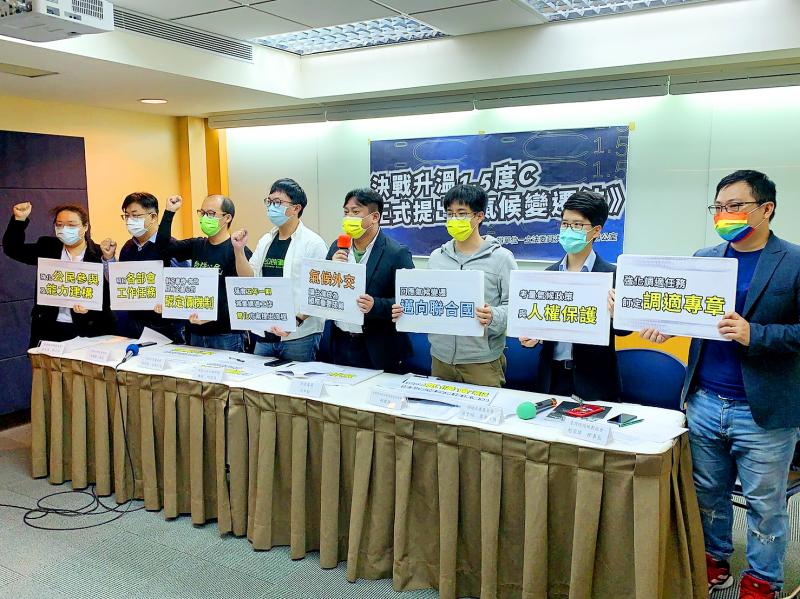Democratic Progressive Party (DPP) Legislator Hung Sun-han (洪申翰) and civic groups yesterday introduced a draft act on climate change, urging the government to work with like-minded partners to advance climate action.
Such legislation is key to improving the nation’s global participation as well as local governance, Hung told a news conference in Taipei.
The goal is for the proposed rules to replace the Greenhouse Gas Reduction and Management Act (溫室氣體減量及管理法), which has proven to be incapable of curbing greenhouse gas emissions since its implementation in 2015, he said.

Photo courtesy of Hung Sun-han’s office
If promulgated, the bill would push the government to pledge to achieve net zero greenhouse gas emissions by 2050, instead of just halving the 2005 level as stipulated in the act.
It says that the government should impose a “carbon levy” and promote incentives for reducing carbon emissions.
The government should also establish a board at the Executive Yuan chaired by the premier that would oversee climate action at government agencies, the proposal says.
Record-high temperatures in Taiwan in July and water shortages that have affected agricultural irrigation highlight the urgency of a policy program that better addresses extreme weather events, Taiwan Environment and Planning Association chairman Chao Chia-wei (趙家緯) said.
The draft, which has a chapter on adaptation to climate change, promotes bottom-up and community-based action and policymaking grounded on scientific evidence, while clarifying the responsibilities of government agencies, Chao said.
The bill is not merely for environmental protection, but also to stimulate economic growth, Citizen of the Earth, Taiwan deputy executive director Tsai Chung-yueh (蔡中岳) said.
The EU’s carbon border adjustment mechanism would soon come into force and US president-elect Joe Biden is likely to follow suit, Tsai said, urging the government to join the trend, especially as the nation is blocked from the Regional Comprehensive Economic Partnership.
A carbon levy could assist with industrial transformation and aid people affected by the transformation, Tsai said.
Four other DPP lawmakers — Su Chiao-hui (蘇巧慧), Saidhai Tahovecahe, Chuang Ching-cheng (莊競程) and Lai Pin-yu (賴品妤) — who attended a news conference with Hung last month — have expressed support for the cause, Hung said, adding that he would rally more support from other lawmakers to arrange a review for the bill soon.
Hung echoed President Tsai Ing-wen’s (蔡英文) appeal for Taiwan to join the UN’s COP26 convention to be hosted by the UK in November next year.
Tsai Ing-wen, at a meeting with British Representative to Taiwan Catherine Nettleton at the Presidential Office in Taipei on Tuesday, expressed hope that the UK would support Taiwan’s bid to join the COP26.
Taiwan should seek to join as a signatory party, instead of just sending non-governmental organization representatives as it has done previously, Hung said.
The goal is politically challenging, but the government should let the world know that “Taiwan can help” rings true not just in curbing the COVID-19 pandemic, but in climate action as well, he said.

An essay competition jointly organized by a local writing society and a publisher affiliated with the Chinese Communist Party (CCP) might have contravened the Act Governing Relations Between the People of the Taiwan Area and the Mainland Area (臺灣地區與大陸地區人民關係條例), the Mainland Affairs Council (MAC) said on Thursday. “In this case, the partner organization is clearly an agency under the CCP’s Fujian Provincial Committee,” MAC Deputy Minister and spokesperson Liang Wen-chieh (梁文傑) said at a news briefing in Taipei. “It also involves bringing Taiwanese students to China with all-expenses-paid arrangements to attend award ceremonies and camps,” Liang said. Those two “characteristics” are typically sufficient

A magnitude 5.9 earthquake that struck about 33km off the coast of Hualien City was the "main shock" in a series of quakes in the area, with aftershocks expected over the next three days, the Central Weather Administration (CWA) said yesterday. Prior to the magnitude 5.9 quake shaking most of Taiwan at 6:53pm yesterday, six other earthquakes stronger than a magnitude of 4, starting with a magnitude 5.5 quake at 6:09pm, occurred in the area. CWA Seismological Center Director Wu Chien-fu (吳健富) confirmed that the quakes were all part of the same series and that the magnitude 5.5 temblor was

The brilliant blue waters, thick foliage and bucolic atmosphere on this seemingly idyllic archipelago deep in the Pacific Ocean belie the key role it now plays in a titanic geopolitical struggle. Palau is again on the front line as China, and the US and its allies prepare their forces in an intensifying contest for control over the Asia-Pacific region. The democratic nation of just 17,000 people hosts US-controlled airstrips and soon-to-be-completed radar installations that the US military describes as “critical” to monitoring vast swathes of water and airspace. It is also a key piece of the second island chain, a string of

The Central Weather Administration has issued a heat alert for southeastern Taiwan, warning of temperatures as high as 36°C today, while alerting some coastal areas of strong winds later in the day. Kaohsiung’s Neimen District (內門) and Pingtung County’s Neipu Township (內埔) are under an orange heat alert, which warns of temperatures as high as 36°C for three consecutive days, the CWA said, citing southwest winds. The heat would also extend to Tainan’s Nansi (楠西) and Yujing (玉井) districts, as well as Pingtung’s Gaoshu (高樹), Yanpu (鹽埔) and Majia (瑪家) townships, it said, forecasting highs of up to 36°C in those areas